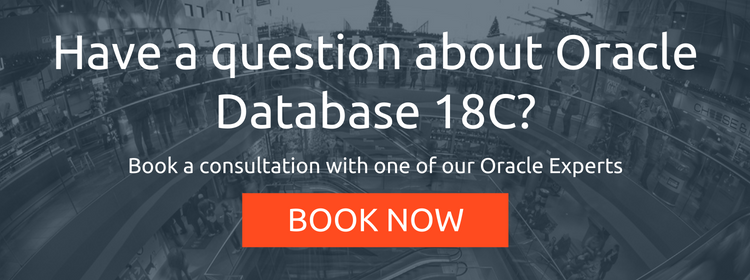- About
Getting to know us
- Services
- Managed Services
- Application Services
- Cloud Services
- Data Science
- Consulting Services
- Technology Solutions
Managed Services
Application Services
Data Science
Consulting Services
Technology Solutions
- Industries
- Resources
Resources
- Contact
- Contact us
What impact will Oracle 18c have on DBAs?
Contents
Will DBAs be fired now people are buying autonomous databases? Does 18c mean the end of DBAs? There’s been a lot of talk in the Oracle community, both online and at events, with some amusing predictions claiming 18c means the Beginning Of The End. But, without dismissing the furore entirely, what impact will Oracle’s new flagship product, the 18c Autonomous Database, have on DBAs? It’s a valid question, and we’re willing to argue that 18c is fundamentally a good thing for DBAs. Fighting the inevitable rise of automation is probably futile, and it’s worth noting that Oracle has been including more and more automation in each major release for several years now.
Why is 18c proving so controversial?
Well, let’s take a short excerpt from their press release: Oracle introduces the world’s first autonomous database cloud. Oracle Autonomous Database Cloud eliminates complexity, human error, and manual management, helping to ensure higher reliability, security, and more operational efficiency at the lowest cost. On the face of it, it could look like Larry Ellison is gunning for DBAs. And why not? Oracle databases are the backend of many business-critical processes, and eliminating human error is an entirely laudable aim. Nobody ought to be upset at the promise of higher reliability, security and better efficiencies.
The controversial claims are around eliminating complexity, manual management and pitching the service at cost-sensitive customers. We’re going to focus on the three claims isolated above: eliminating complexity, the end of manual management, and a reduction in costs.
Does 18c eliminate complexity?
The quick answer to this is yes and no. For those DBAs already familiar with Oracle cloud offerings, the various different tiers and services available, firstly - congratulations! Simply by virtue of it being new, there are a lot of IT teams and DBAs out there for whom considering a move to the cloud will be every bit as complicated as traditional on-premise versions. This is breaking new ground for Oracle, and given the lifecycles of current products, we’re not expecting everyone to jump ship to Oracle Cloud immediately. However, it’s also true to say that by and large, once it’s configured and installed properly, 18c does reduce some complexity. This doesn’t in any way reduce the need for a DBA, but it helps DBAs by making it harder to make costly mistakes. Ultimately, it’s still going to be a DBA that will estimate costs, procure the right combination of platforms, cloud infrastructure and licences, and write policies for the day-to-day running of the database - whether it’s in the cloud or not.
Will a DBA be freed from manual management?
Those of us with many years’ experience in the IT industry might recognise a disconnect between a vendor’s shiny marketing material and on-the-ground reality. Whilst under perfect conditions, Oracle 18c’s Autonomous Cloud product absolutely has the potential to significantly reduce manual management, we’d never say it would completely eliminate it. An aviation analogy might be helpful: Airbus would never tout their A380 as pilot-free, even though modern autopilot computers significantly reduce the input needed from experienced pilots.
Things like patch management and even database performance tuning can now be automated, and done without having to take the database offline, which is a major step forward. However, it remains to be seen how effective the AI engine will be at recommending and implementing changes once applied to specific environments. The AI engine will have no visibility over your entire network, infrastructure and applications, and you’ll still need experts to analyse what impact patches might have on the rest of your environment.
Does 18c mean reduced costs?
Again, this is nuanced. In terms of hardware costs, cloud infrastructure frees organisations from significant investment in on-premise architecture that will depreciate quickly and may not scale as easily. It’s another capital expenditure-vs-operating expenditure argument, and that will come down to how your organisation is structured and operates. However, in terms of staffing costs, yes, there are some situations where the Autonomous Database suite might mean less reliance on external consultants, or for large organisations a slight reduction in junior database staff. Oracle’s autonomous offerings mean that DBAs will need to spend less time on admin, less time on infrastructure, less time on upgrades, less time on patching and tuning, and spend more time on higher-value activities like innovation, database design, data analytics, data policies and data security.
Before tearing up your Oracle certifications and re-writing your CV, it’s important to remember:
- Oracle 18c does not automatically mean the Autonomous Database suite of services
- The Autonomous Database Service suite is not Oracle 18c
- The Autonomous Database suite are services which will only currently run in Oracle Public Cloud
- 12cR2 is being supported until at least April 2025, so customers won’t jump to 18c immediately

.png?width=250&name=stonewater-logo%20(1).png)

